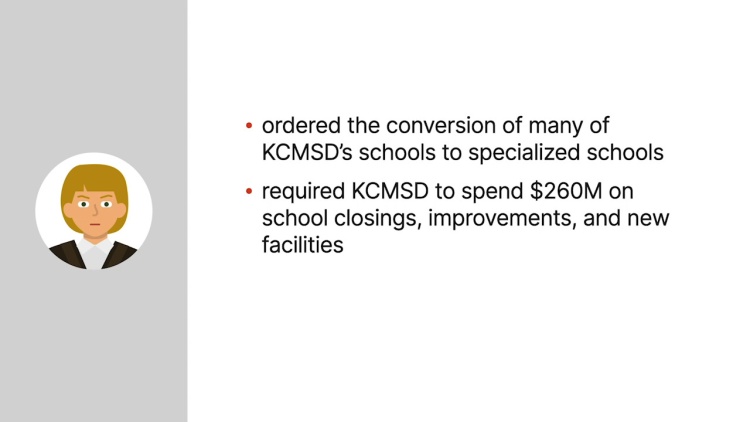Missouri v. Jenkins (Jenkins II)
United States Supreme Court
495 U.S. 33 (1990)
- Written by Rebecca Wilhelm, JD
Facts
The Kansas City, Missouri, School District (the district) (plaintiff) and a group of students (plaintiffs) sued Missouri (defendant) in 1977 for maintaining a segregated school system in violation of Brown v. Board of Education, 347 U.S. 483 (1954). The federal district court realigned the school district as a defendant in the case and held that the state and district had violated Brown. Specifically, the district court found that the physical facilities “have literally rotted” and that educational services “were substandard in an increasingly all-black system.” The district court ordered the district to make every high school and middle school, as well as half of the elementary schools, magnet schools for specific topics, such as foreign language or math and sciences. The district was also ordered to spend $260 million on capital improvements, including closing certain schools, renovating others, and building new facilities. The court ordered an increase in the local property tax to pay for these improvements. The court hoped that such changes would encourage white students to re-enter the public school system while providing minorities with a quality education. The U.S. Supreme Court limited its review to the method of financing the remedy.
Rule of Law
Issue
Holding and Reasoning (White, J.)
Concurrence (Kennedy, J.)
What to do next…
Here's why 903,000 law students have relied on our case briefs:
- Written by law professors and practitioners, not other law students. 47,100 briefs, keyed to 995 casebooks. Top-notch customer support.
- The right amount of information, includes the facts, issues, rule of law, holding and reasoning, and any concurrences and dissents.
- Access in your classes, works on your mobile and tablet. Massive library of related video lessons and high quality multiple-choice questions.
- Easy to use, uniform format for every case brief. Written in plain English, not in legalese. Our briefs summarize and simplify; they don’t just repeat the court’s language.





